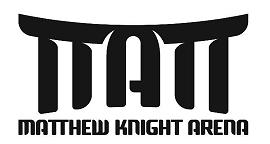Matthew Knight Arena
 |
|
|
The exterior of the arena
|
|
| Location | 1390 Villard St. Eugene, OR 97401 United States |
|---|---|
| Coordinates | 44°02′42″N 123°03′58″W / 44.045°N 123.066°WCoordinates: 44°02′42″N 123°03′58″W / 44.045°N 123.066°W |
| Owner | National Championship Properties, (Subsidiary of University of Oregon) |
| Operator | Arena Network |
| Capacity | 12,364 |
| Construction | |
| Broke ground | February 7, 2009 |
| Opened | January 13, 2011 |
| Construction cost | $227 million ($242 million in 2017 dollars) |
| Architect |
TVA Architects Ellerbe Becket |
| Structural engineer | Haris Engineering, Inc. |
| Services engineer | Henderson Engineers Inc. |
| General contractor | Hoffman Construction Company |
| Tenants | |
| Oregon Ducks (NCAA) (2011-present) | |
The Matthew Knight Arena (MKA) is a 12,364 seat, multi-purpose arena in Eugene, Oregon, United States. It is home of the University of Oregon Ducks basketball teams, replacing McArthur Court. It is located on the east side of campus at the corner of Franklin Boulevard and Villard Street, a gateway to campus as people arrive from I-5. The arena was originally intended to be ready for the start of the 2010–11 basketball season, but instead opened for the men's basketball game against the USC Trojans on January 13, 2011. It is named for chief donor Phil Knight's son, Matthew Knight, who died at the age of 34 in a scuba diving accident. The arena cost $227 million and was designed as collaboration between TVA Architects of Portland, Oregon and Ellerbe Becket of Kansas City, Missouri. Hoffman Construction Company of Portland, Oregon was the general contractor.
The Ducks inaugurated the arena to a sold-out crowd on January 13, 2011, beating the USC Trojans 68–62.
The arena floor is named Kilkenny Floor after former Oregon Athletic Director Pat Kilkenny. Called "Deep in the Woods", the design features repeating silhouettes of Pacific Northwest tree lines, giving the impression of being lost in the forest, gazing toward the sky. The floor was designed by Tinker Hatfield, Nike's VP of Creative Design, who intended to design an "iconic television presence possible for the University of Oregon" and honor the "Tall Firs", the nickname of the 1938–39 Oregon Ducks men's basketball team, winners of the inaugural NCAA basketball championship.
...
Wikipedia

